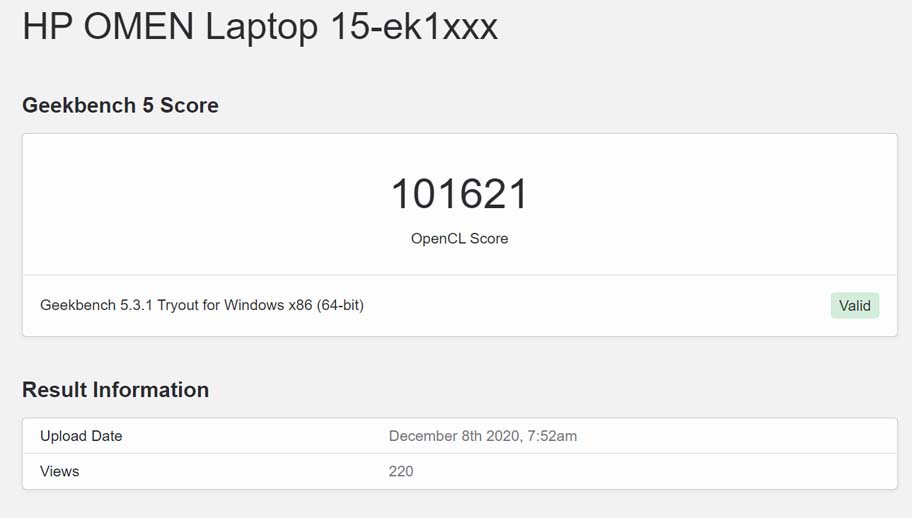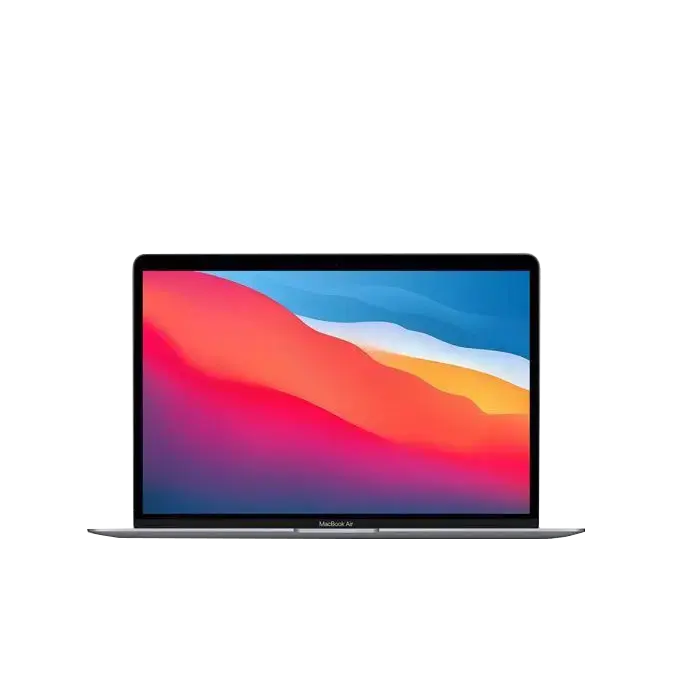
Gamers and enthusiasts have expectations from the upcoming mobile processors based on NVIDIA’s Ampere microarchitecture. After all, the GeForce RTX 30 series of desktop processors had the greatest performance leap from its predecessor in the GeForce’s entire lineup. It looks like we are getting closer. Benchmark results of RTX 30-series mobile graphics processors have started popping up on the internet. In the latest news, the NVIDIA GeForce RTX 3070 Max-Q has recorded a double-digit improvement in certain benchmark tests than its predecessor.
NVIDIA GeForce RTX 3070 Max-Q
The benchmark tests were carried out in an HP system. The HP Omen 15 gaming laptop that went through the test was equipped with the 10th-gen Intel Core i7-10870H and NVIDIA GeForce RTX 3070 Max-Q. The GPU used here looks to be a Max-Q variant as the maximum frequency is just 1.29GHz. Similarly, the laptop had 16GB of RAM.
Benchmark Result
The system has put through Geekbench’s OpenCL test two times. The results of the tests were shared by Tum Apisak. With the RTX 3070 Max-Q, the HP Omen gaming laptop was able to score respective scores of 101,621 and 110,839 points. If you check the OpenCL chart, the above-mentioned score puts the GeForce RTX 3070 Max-Q in the same ballpark as the GeForce RTX 2080 (desktop).
Even if you compare the score of RTX 3070 mobile GPU with its predecessor, the performance gap is significant. The RTX 2070 Max-Q was successful in scoring 74,314. Compared to mobile RTX 3070’s scores of 101,621 and 110,839, the RTX 2070 Max-Q is 36.9 and 49.3% lower respectively.
Specs
The benchmark results have revealed some details about the specs of the NVIDIA GeForce RTX 3070 laptop GPU. According to the listing, this mobile GPU comes with 40 compute units and 5,120 CUDA cores. The memory bus on this GPU is 256-bit wide. Similarly, the GPU has 8GB of VRAM.
- Check out our review of the Asus ROG Strix Scar 15.


















![Best Ultrabooks To Buy in Nepal 2024 [Updated] Best Ultrabook Laptops in Nepal 2023 - June Update](https://cdn.gadgetbytenepal.com/wp-content/uploads/2023/04/Best-Ultrabook-Laptops-in-Nepal-2023-June-Update.jpg)
![Best Gaming Laptops in Nepal 2024 [Updated] Best Gaming Laptops in Nepal 2023 - June Update](https://cdn.gadgetbytenepal.com/wp-content/uploads/2023/04/Best-Gaming-Laptops-in-Nepal-2023-June-Update.jpg)


![Best Mobile Phones Under Rs. 15,000 in Nepal [Updated] Best Phones Under 15000 in Nepal 2024 Budget Smartphones Cheap Affordable](https://cdn.gadgetbytenepal.com/wp-content/uploads/2024/03/Best-Phones-Under-15000-in-Nepal-2024.jpg)
![Best Mobile Phones Under Rs. 20,000 in Nepal [Updated] Best Mobile Phones Under NPR 20000 in Nepal 2023 Updated Samsung Xiaomi Redmi POCO Realme Narzo Benco](https://cdn.gadgetbytenepal.com/wp-content/uploads/2024/01/Best-Phones-Under-20000-in-Nepal-2024.jpg)
![Best Mobile Phones Under Rs. 30,000 in Nepal [Updated]](https://cdn.gadgetbytenepal.com/wp-content/uploads/2023/12/Best-Phones-Under-30000-in-Nepal-2024.jpg)
![Best Mobile Phones Under Rs. 40,000 in Nepal [Updated] Best Phones Under 40000 in Nepal 2024 Smartphones Mobile Midrange](https://cdn.gadgetbytenepal.com/wp-content/uploads/2024/02/Best-Phones-Under-40000-in-Nepal-2024.jpg)
![Best Mobile Phones Under Rs. 50,000 in Nepal [Updated] Best Phones Under 50000 in Nepal 2024 Smartphones Midrange](https://cdn.gadgetbytenepal.com/wp-content/uploads/2024/02/Best-Phones-Under-50000-in-Nepal-2024.jpg)
![Best Flagship Smartphones To Buy In Nepal [Updated] Best Smartphones in Nepal 2024 Flagship Premium Samsung Apple iPhone Xiaomi OnePlus Honor](https://cdn.gadgetbytenepal.com/wp-content/uploads/2023/09/Best-Smartphones-in-Nepal-2024.jpg)